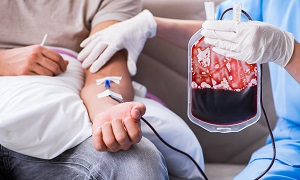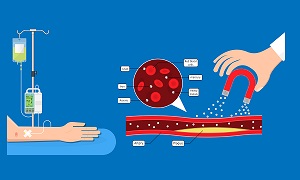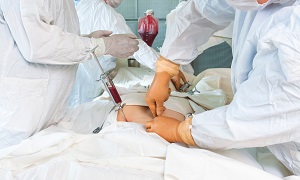Best Doctors in India for Thalassemia Treatment
Best Hospitals in India for Thalassemia Treatment
CK Birla Hospital, Gurugram
- City: Gurugram, India
Hospital Highlights:
- The CK Birla Hospital in Gurugram is a NABH-accredited multi-specialty hospital.
- The hospital strives to increase the quality of healthcare by focusing on UK NHS nurse and midwife training requirements. Policies and practices derived from the National Institute for Health and Treatment Excellence (NICE) recommendations in the United Kingdom ensuring that a strong focus on safety, high-quality clinical care, and sanitation is maintained.
- The hospital’s cutting-edge technology and facilities allow for real-time communication and seamless collaboration among caregivers, ensuring accuracy and the best possible results. Those with foreign experience and accreditations make up part of the hospital’s team of clinicians.
KIMS Hospital, Hyderabad
- City: Hyderabad, India
Hospital Highlights:
- KIMS Hospital (a brand name of Krishna Institute of Medical Sciences) is one of the largest and best multi-speciality hospitals in Hyderabad. The hospital provides various treatments to an enormous number of patients.
- The hospital has a capacity of more than 3000 beds. KIMS Hospitals offers different healthcare services in more than 25 specialities and super specialities.
- The hospital is equipped with modern medical equipment and technology. It has robotic equipment to provide minimal invasive techniques for patients.
- The hospital is aimed at providing world-class healthcare facilities and services at an affordable cost for patients.
- The various specialities and departments of the hospital include neurosciences, gastroenterology & hepatology, robotic science, reproductive sciences, dental science, oncological sciences, organ transplantation, heart and lung transplantation and mother and child care.
Fortis Hospital, Shalimar Bagh
- City: New Delhi, India
Hospital Highlights:
- Fortis Hospital in Shalimar Bagh is a multi-super specialty hospital that strives to provide world-class patient care by leaving no stone unturned.
- Fortis, Shalimar Bagh, with 262 beds and a 7.34-acre footprint, provides the best level of medical care through its team of doctors, nurses, technicians, and management professionals.
Reliance Hospital, Mumbai
- City: Mumbai, India
Hospital Highlights:
- Reliance Hospital is one of the best super-specialty care hospitals in Navi Mumbai.
- The main purpose of this hospital is to become a trustworthy place for the best health and hope for society. The hospital is well connected to the suburbs of Mumbai and Navi Mumbai.
- The hospital has various specialty departments, viz., Accident & Emergency, Anesthesiology, Dental Services, Dermatology, Diabetology, Dietetics Nutrition, Endocrinology, ENT, Gastroenterology, General Surgery, Gynaecology And Obstetrics, Hepato Pancreato Biliary Surgery, Infectious Disease, Internal Medicine, Interventional Radiology, Laboratory Medicine, Minimal Access Laparoscopic Surgery, Nephrology, Neurosciences, Opthalmology, Orthopaedics, Paediatrics, Pain Management Palliative Care, Physical Medicine Rehabilitation, Plastic And Reconstructive Surgery, Psychiatry, Pulmonary Medicine, Radiology, Rheumatology, Transplant, Urology Andrology, Vascular Surgery
Lilavati Hospital & Research Centre, Mumbai
- City: Mumbai, India
Hospital Highlights:
- Lilavati Hospital & Research Centre is India’s premier multi-speciality tertiary care hospital and has been recognised as a global medical excellence centre.
- Lilavati Hospital & Research Centre has built an unrivalled level of trust with its patients over the years, thanks to a solid foundation that comprises cutting-edge facilities, the best medical competence, research, education, and charity endeavours.
- The hospital is quite proud of the fact that it now serves patients from all kinds of backgrounds, not just from the United States but from all around the world.
- The hospital has a total of 323 beds, one of the largest Intensive Care Units (ICUs), 12 Operation Theatres with modern amenities, over 300 consultants, and almost 1,800 personnel.
What is Thalassemia?
Thalassemia is an inherited blood disorder in which the patient’s body makes inadequate amount or abnormal form of haemoglobin. Haemoglobin of Red Blood Cells carries oxygen through the body. Thalassemia results in damage of large number of RBCs thereby making the patient anemic.
Thalassemia is a genetic disorder. Thalassemia is caused by mutations in the DNA of cells that forms the haemoglobin & these are passed from parents to children.
There are two proteins involved in the formation of haemoglobin, viz. Alpha and Beta proteins. Type of Thalassemia depends on these two proteins. Alpha thalassemia means the body lacks alpha haemoglobin & Beta thalassemia is when the body lacks Beta haemoglobin.
Signs & symptoms of Thalassemia
Signs & symptoms of Thalassemia are:
- Fatigue
- Weakness
- Brittle bones
- Loss of appetite
- Pale or yellow skin
- Jaundice
- Swelling in the abdomen
- Dark urine
- Delayed growth in children
- Heart problems
Diagnosis of Thalassemia
- Prenatal Examinations- Certain tests can be done before a baby is born to find out if the baby has thalassemia. These tests are:
- Chorionic villus sampling test involves removal of tiny piece of the placenta for evaluation and is usually done around the 11th week of pregnancy.
- Amniocentesis involves taking a sample of the amniotic fluid that surrounds the foetus and is usually done around the 16th week of pregnancy.
Treatment of Thalassemia
Mild cases of thalassemia require no treatment. Occasionally, blood transfusion and surgery is required to help manage thalassemia complications. Treatment is required for moderate to severe thalassemia. The treatment options are:
Blood transfusions
Iron chelation therapy
Bone marrow transplant
Bone Marrow or Stem Cell Transplant involves transferring of stem cells or bone marrow from a compatible donor, usually sibling. This procedure eliminates the lifelong blood transfusions and drugs to control excess of iron.










